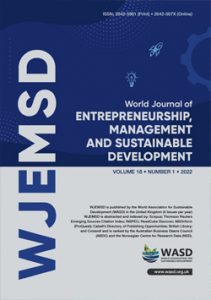Future of Egyptian female entrepreneurs post COVID-19, Doaa Abdou
 Doaa M. Salman Abdou
Doaa M. Salman Abdou
Department of Economics
October University for Modern Sciences and Arts, MSA University, Giza
Egypt
Email: doaaslman@yahoo.com; dsalman@msa.eun.eg
DOL: 10.1108/WJEMSD-07-2020-0094
Purpose: Currently, COVID-19 delayed economic growth and forced many businesses to shut down. Both formal and informal entrepreneurs are trying to develop a way out to survive. To measure the impact of the current crisis it is important to consider that many females are unrecorded in the formal market due to their secondary jobs as housewives. This paper explores some of the determinants that contribute in the acceleration of the Egyptian female entrepreneurs (EFEs) to participate in the labour force.
Design/methodology/approach: The Dynamic model can determine the link between EG and Egyptian female labour force participation (EFLFP) for the period between 1990 and 2019. The cointegration test provides an insight on the future path of the relation and the significant role of EFEs in the labour market.
Findings: The outcomes point out the existence of a positive significant impact by the EG on the EFLFP and a fluctuating relation between fertility rates and the EFLFP. The results support the literature and highlight the current challenges, as the EFLFP is minute due to the increase of EG. Taking into consideration that many female activities are unrecorded and official statistics only counts the monetarist economic activities and does not include the secondary and mandatory activities – delivered at house. Results provide guidance on setting the required strategies and policies to survive after the corona crisis.
Research limitations/implications: The study cover only the time interval during 1990 and 2020. No available data before this interval.
Practical implications: Egyptian entrepreneurs is challenged with numerous obstacles difficulties such as lack of experience, shortages of finance, marketing channels and finally the pandemic. On ground many entrepreneurs depend on starting their business using a bootstrapping approach to overcome such obstacles and focuses on primary activities. In developing countries the importance role of female entrepreneurs needs to be disseminated as they can function efficiently from home and can balance between house commitment and the country commitments. Using technology can help in measure the female participation and foster their education to enter entrepreneurial activities and accelerate development and growth.
Social implications: In developing countries the importance role of female entrepreneurs needs to be disseminated as they can function efficiently from home and can balance between house commitment and the country commitments. Using technology can help in measure the female participation and foster their education to enter entrepreneurial activities and accelerate development and growth.
Originality/value: The current study contributes to the new stream of empirical analysis that provides evidence of the role of EFEs in one of the highest population developing countries (Egypt) during the time of corona virus. Also, shows the impact of COVID-19 that forced EFEs to develop micro-businesses. Results point out to the minor role of EFEs in the formal economic activities and provide an insight on the required regulations and policies to accelerate EFEs. Female activities in the informal market that are unmeasured lead to underestimating the female contribution. As well, the indirect role of female at house is not included in the data.
Keywords: COVID-19; Dynamic model; Economic growth; Female entrepreneurs; J16; J21; C36.
Citation: Salman Abdou, D.M. (2021), "Future of Egyptian female entrepreneurs post COVID-19", World Journal of Entrepreneurship, Management and Sustainable Development, Vol. 17 No. 3, pp. 526-536. https://doi.org/10.1108/WJEMSD-07-2020-0094

